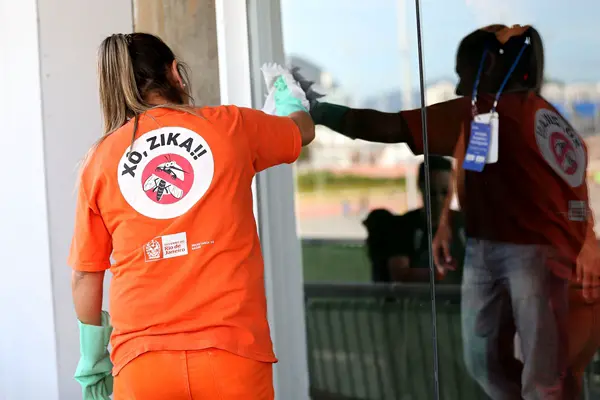With one month to go, Rio de Janeiro is fully occupied with the preparation for the Olympic and Paralymic Games to be held for the first time in South America from August to September.
Besides a somewhat crippling interim government, the public cast much doubt about the delayed construction of sports venues, the under-budget security, the rampant Zika virus, as well as the pollution of water game locations.
Although the bad publicity and rumors about the Rio' s preparation grow, readers should have a better understanding of the truth behind. Rio now is sparing no effort to finalize the venue construction. Security is on the top concern of organizers while Zika virus is supposed to fall during the Games.
Construction work on Rio's Olympic Park has reached 99% completion with 5 of 9 venues at the park are ready. Media facilities and the Olympic Park hotel are ready. However some constructions are still undergoing. Laborers are still completing work on the velodrome, a warm-up pool at the Maria Lenk Aquatic centre, two tennis courts and access ramps at Olympic Arena.
Different from the venue delay before the 2014 FIFA World Cup, Rio Olympics venue construction doesn' t cause too many troubles. However, the security is an issue Rio worries a lot.
A recent survey shows that the security is the top concern of local people regarding to the Olympics. As the state of Rio is currently trapped in financial crisis, some policemen also protest for their unpaid salaries.
More than 500,000 tourists and over 10,000 athletes are expected to come to Rio soon. To protect them from threats, a security force of 85,000 police and military staff will be deployed on streets and in venues, two times bigger than the London Olympics.
Amid the financial crisis, Brazil's federal government has also agreed to provide the state of Rio with 850 million U.S. dollars in emergency funds to guarantee security of the Olympic Games. According to Alexandre de Moraes, the Minister of Justice in Brazil, with the emergency funds, policemen in Rio could get their salary paid and the policemen will have all the working facilities. However, due to the favela and robbery crime, people come to Rio have to pay special attention to personal security.
Moraes also pointed out that the intelligence cooperation with different parts of the world indicates that currently there is no possibility of terrorist attacks on Rio Olympics. But Brazil will continue to work with more than 100 security intelligence agencies to fight against terrorism.
Zika virus, which causes cerebral deficiency in baby due to infected mother, has also drawn wide concern. Organizers and medical authorities have said that Zika cases in Rio have dropped sharply in recent weeks and will fall to almost zero during the dry winter months of the Games.
The CEO of Rio organizing committee Sydney Levy also said that there were too many people outside of Brazil talking about Zika with too many negative comments. He said it was good for people to hear other voices.
Another long-time worry is about the water pollution in Rio. Outdoor water games will be held at Beach Copacabana, Lagoon Rodrigo de Freitas and Bay Guanabara. Rio's ability to manage such locations for sports purposes is widely debated by media as well as professionals.
Rio has "failed" on its promise to clean 80% of water pollution by the Olympics, but Rio organizing committee CEO Sydney Levy said 4 of 5 sites on the Guanabara Bay are tested daily for bacteria and will not pose any problems and left open the possibility of moving the other.
As the preparation race comes to a final stage, Rio's mayor and Olympic organizers have also fought back towards negative reports. Mayor Eduardo Paes said Tuesday that improvements to Rio are on par with those credited with bringing huge urban renewal to Barcelona in 1992. "The Rio 2016 Games can also transform the city," he said.
And Carlos Nuzman said the fact that Rio was succeeding in such hard circumstances showed the Olympics are not just for developed countries. "I'm a firm defender of organizing the Olympics on all continents, the poorest and the richest," he said.
(APD)
 简体中文
简体中文

